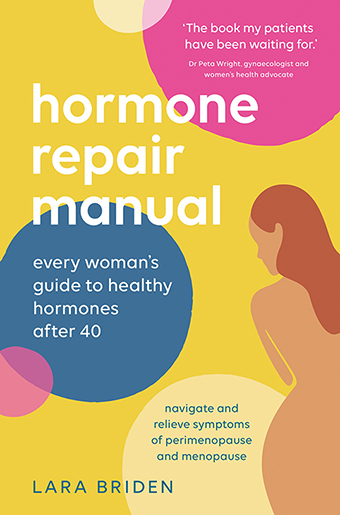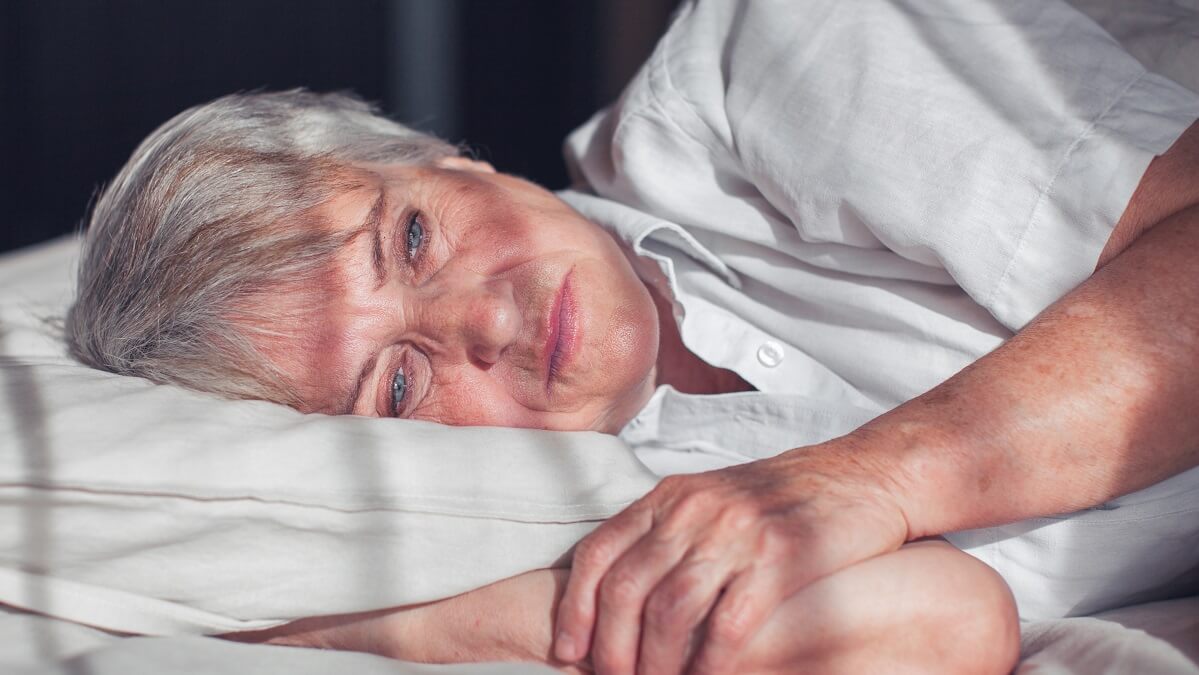In this extract from her book Hormone Repair Manual, Lara Briden shares expert knowledge on sleep disorders and strategies to overcome them.
•••
Sleep disturbance is the second most common symptom of menopause or perimenopause after hot flushes. During perimenopause, the problem can be trouble falling or staying asleep or both. With menopause, the problem is more likely to be waking too early. As to why perimenopause and menopause so strongly affect sleep, it’s a combination of:
- high histamine during the high-oestrogen stage of perimenopause
- disruption of the sleep centres of the brain due to the drop in progesterone and oestradiol.
What if flushes don’t end?
In theory, hot flushes should occur only during your late perimenopausal years, including the 12 months after your final period. After that, your brain should recalibrate and re-establish its normal thermoneutral zone.
In practice, of course, that’s not always what happens. You could experience flushes for as long as 10 years after your final period, especially if you suffer from chronic stress or have insulin resistance. In those later years, the best strategy is to work to stabilise the HPA axis and reverse insulin resistance.
You could also find yourself in the situation of flushing later in life because you’re trying to come off oestrogen or if you have:
- altered circadian rhythm due to the drop in oestradiol
- reduced melatonin
- impaired ability to cope with stress
- sleep-disturbing symptoms such as hot flushes, bladder
- frequency, fibromyalgia and restless legs syndrome
- sleep apnoea.
Restless legs syndrome is the condition of having an unpleasant aching or crawling sensation in the legs and a strong desire to move them.
Sleep apnoea, also called obstructive sleep apnoea (OSA), is a potentially serious sleep disorder in which breathing repeatedly stops and starts during the night. Symptoms include loud snoring, gasping or snorting sounds, frequent urination during the night, dry mouth or headaches on waking, and daytime sleepiness and fatigue with trouble concentrating. Without treatment, sleep apnoea can increase the risk of heart disease, stroke and diabetes.
If you think you might have sleep apnoea, see your doctor, who may order a sleep study and prescribe a CPAP machine to use at night to keep your airways open. Other treatments for sleep apnoea include surgery, breathing exercises and reversing insulin resistance.
If your sleep problem is the result of sleep-disturbing symptoms, your best sleep strategy is to address the underlying symptom.
Conventional treatment for menopausal sleep disturbance
Oestrogen therapy is the main conventional treatment for menopausal sleep disturbance, and it can work very well, especially in combination with real progesterone (not a progestin).
Progesterone-alone is strongly sedating when taken as a capsule, because it converts to allopregnanolone, a neurosteroid that interacts with GABA (gamma-aminobutyric acid) receptors.
The other mechanism by which progesterone improves sleep is by acting directly on the sleep centres of the brain and promoting beneficial deep sleep.
Progesterone also reduces mast cell activation and histamine, two underlying causes of insomnia, and stimulates rather than impairs the breathing reflex, so it can be safely combined with other sleep medications.
Here’s a tip: Progesterone is so sedating that if you have been prescribed progesterone for another condition, you should take it at bedtime, or it will cause you to feel groggy.
Sleeping tablets and/or antidepressants are the other conventional options for sleep. You might get best results from an antihistamine type of sleeping tablet, such as doxylamine succinate, but speak to your doctor. Short-term or occasional use is fine but chronic, long-term use of any sleeping tablet can be habit forming, impair sleep quality, and increase the risk of cognitive decline and dementia. Additionally, sedating antihistamines can cause weight gain.
Medicinal cannabis contains cannabidiol (CBD), which has anti-inflammatory and anxiolytic (reducing anxiety) properties and has been found in preliminary studies to improve perimenopausal sleep. Depending on the formulation, medicinal cannabis may contain only CBD or a combination of CBD and tetrahydrocannabinol (THC), which is more strongly sedating and is responsible for the ‘stoned’ feeling associated with cannabis.
Medicinal cannabis is usually ingested as oil and takes effect after 30 to 120 minutes.
Supplements and herbal medicines to improve sleep
Magnesium and taurine are once again my top supplement recommendations. Here’s more about their role in sleep as well as some information about a few other supplements.
Magnesium
In a small clinical trial, older adults who took magnesium had measurably lower levels of cortisol and better-quality sleep.
How it works: Magnesium calms the brain by supporting GABA, the brain’s main calming neurotransmitter, while at the same time reducing glutamate, the brain’s main stimulating neurotransmitter. A healthy balance between GABA and glutamate is the primary determinant of sleep quality, including time spent in slow wave or deep sleep. Magnesium also reduces the stress hormone cortisol.
What else you need to know: The therapeutic dose for sleep is 300mg and is best taken as magnesium glycinate, which is magnesium joined to the amino acid glycine. You also can take additional glycine.
Glycine
Glycine is a small amino acid that has lots of jobs in the body, including building collagen, maintaining healthy insulin sensitivity and acting as a calming neurotransmitter in the brain. As a supplement, it can shorten the time to fall asleep and reach slow-wave sleep.
How it works: Glycine promotes sleep by boosting serotonin and melatonin, calming the brain and lowering core body temperature.
What else you need to know: The dose for sleep is 3-5g taken an hour before bed. Glycine is safe and has no known side-effects.
Taurine
Like glycine, taurine is an amino acid that is also a neurotransmitter. It has other beneficial effects, such as promoting healthy insulin sensitivity and energy metabolism.
How it works: Taurine calms GABA receptors.
What else you need to know: The dose for sleep is 3g taken in the afternoon or evening. And if you’re remembering taurine as an ingredient in energy drinks, understand that it was put there to calm the brain and counteract the stimulating effects of sugar and caffeine.
Here’s a tip: For my patients struggling with sleep, I typically prescribe a magnesium glycinate powder, which also contains 3g of taurine.
Melatonin
Melatonin is a darkness hormone that works to promote sleep and synchronise the body clock. Melatonin is also good for bones, and can have beneficial anti-inflammatory effects for migraines, fibromyalgia, acid reflux, endometriosis and bone health.
How it works: Melatonin supports a healthy circadian rhythm and lowers core body temperature.
What else you need to know: According to University of North California neurologist Dr Heidi Roth, melatonin works best for sleep when taken about six hours before bedtime and at a dose of 0.5-1.0mg. Higher doses can be used for fibromyalgia or migraine prevention, as discussed in the Migraines section on page 173 and the Aches and pains section on page 220. Melatonin might also help to reduce the risk of osteoporosis and breast cancer.
Melatonin cannot be sold over the counter in Australia or New Zealand, so the ‘melatonin’ products in your local supplement shop are highly diluted or homeopathic melatonin, which will not deliver the same benefits. The only way to access real melatonin is to order it from an overseas online dispensary or obtain a script from your doctor. Most GPs are happy to prescribe melatonin because it’s safe and not addictive.
Ziziphus
Ziziphus is my favourite herbal medicine for perimenopausal sleep problems because it can also relieve hot flushes. It’s extracted from the seeds of Ziziphus spinosa or Ziziphus jujuba and has non-addictive sedating effects.
How it works: It calms the brain by enhancing both GABA and serotonin.
What else you need to know: The exact quantity of the herb depends on the concentration of the formula, so please take as directed on the bottle and do not combine with sleeping tablets except under professional advice. Several herbal sleep formulas contain ziziphus together with other sedating herbal medicines, such as magnolia (Magnolia officinalis).
Other herbal medicines to consider for menopausal insomnia include valerian, ashwagandha, magnolia and hops.
Here’s a tip: You don’t need all the supplements. Start with magnesium, glycine and taurine (hopefully all in one supplement) and see how you go.
Diet and lifestyle to improve sleep
Practise good sleep hygiene, which includes movement and outdoor light during the day, establishing a regular relaxing bedtime routine, maintaining a cool dark bedroom, and not working in bed or being exposed to blue light in the evening.
Choose a strategy (or strategies). My top picks are yoga, morning light, protein in the morning and a hot bath before bed but find the combination that works for you.
Reduce or quit alcohol because it impairs sleep quality and can worsen hot flushes.
Be careful with caffeine because it’s a stimulant. One coffee in the morning is probably not a problem but several coffees or coffee too late in the day could affect sleep.
Consider the low-histamine diet if you’re showing signs of mast cell activation or high histamine.
Try re-introducing starch if you developed insomnia while on a keto diet or very low carbohydrate diet. Carbs with your evening meal can help to calm the nervous system.
Make sure you’re eating enough iron foods such as meat, especially if you have heavy periods, because iron deficiency can cause insomnia.

Managing expectations and knowing your chronotype
Shortly, I’ll survey some of the supplements for sleep, but before we do that, take a moment to consider whether your current sleep problem is new with perimenopause or the continuation of an ongoing problem.
In the case of a new sleep problem, you can probably expect to see quick results from progesterone, magnesium, taurine and a little basic sleep hygiene.
In the case of an ongoing problem with sleep, you may see quick results, which will be great. You may, however, see only gradual improvement and not the perfect sleep cure you crave. Trust me when I say you need to play the long game, which means focusing on soothing your nervous system and at the same time not becoming hyper-focused on having a perfect night.
As a veteran insomniac, I’ve been happily surprised by the state of my perimenopausal sleep. It’s not great but it’s not terrible, and I don’t think it’s any worse than when I was younger. My current state of sleep okay-ness is the result of all the strategies I’ve slowly incorporated over the years, including supplements, morning light and yoga. I’ve also been helped by the simple advice that it’s okay to not sleep sometimes – something my perfectionist’s brain needed to hear. I now accept that I will sometimes not sleep well but it just doesn’t matter as much as I thought it did.
The other thing that’s helped me personally is to finally realise that I had been comparing my sleep to my husband’s sleep but that he and I have different ‘chronotypes’, meaning different circadian rhythms and genetic requirements for sleep. He needs a solid nine hours, but I feel well on seven.
To give you hope, know that sleep typically worsens with perimenopause but then improves again during the postmenopausal years. Once again, it’s a perimenopausal symptom that is likely to be temporary. This is not how you’re always going to be!
Checklist for sleep:
- take magnesium glycinate plus taurine
- support your circadian rhythm with morning light and evening
- dark
- move your body
- consider taking progesterone and melatonin.
This is an extract from Hormone Repair Manual by Lara Briden. Published by Macmillan Australia. RRP $34.99. Available from www.larabriden.com and all good bookstores.
What’s your secret to a good night’s sleep? Why not share your tips in the comments section below?
Health disclaimer: This article contains general information about health issues and is not advice. For health advice, consult your medical practitioner.
Also read: Supplements: The good, the bad and the ugly

